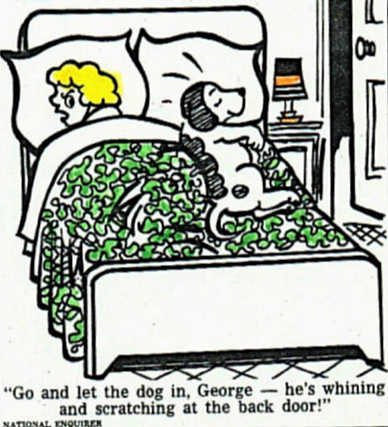So, I learned something very interesting when I went to go and google the bed trick. A nerve-wracking proposition, to say the less, but contrary to the class' worries, nothing extremely vulgar popped up on google, though I did find at least one rather amusing image. However, in all seriousness, in examining the wikipedia article, I found something rather interesting about AWTEW.
In All's Well That Ends Well, Bertram thinks he is going to have sex with Diana, the woman he is trying to seduce; Helena, the protagonist, takes Diana's place in the darkened bedchamber, and so consummates their arranged marriage. In this case, the bed trick derives from Shakespeare's non-dramatic plot source, the ninth story of the third day in the Decameron of Boccaccio (which Shakespeare may have accessed through an English-language intermediary, the version in William Painter's Palace of Pleasure).Just another example of how no story is truly ever an original. At least not in this realm. As stated in class, history is the plane of desolation where mythology does not exist. It always ends in being torn limb from limb, and presumably devoured. If our world is history, we are all doomed. In all honesty, though, I fail to understand why the unwashed masses didn't fall in love with all the foreplay in AWTEW. I found myself giggling more than a few times at the sexual references therein. Perhaps that lumps me in with the masses as well, but I found that I didn't care so much about what was going on in the plot. I was scouring for the next little pun that I might not have noticed had I cared what was going on. Of course, I've always been the one looking for those little plays on words that make a story truly great. I take pride in inserting them into my writing as well (though it might not show in a blog thrown together at a moment's notice). Perhaps Shakespeare was going for crass humor to please those unwashed masses, but that doesn't mean it wasn't funny. Just as the suspension of disbelief is required to keep the audience from scoffing at As You Like It and the absurdity of the (male)deity Hymen descending from the sky, a rejection of what we consider normal is required to make All's Well That Ends Well pleasing to the general public (acid, anyone?)
Oh, and speaking of acid, I watched Moulin Rouge the other day. The play within a play stood out to me in a way that it hadn't before. There were a lot of other things that I noticed too. A lot of them came from my art history class, where we talk about Buddhism and immortality and the brother battle. We haven't yet discussed the purification of the soul that comes with Alchemy, but I have FMA for that. Young Edward Elric trying to right his wrongs and refine his soul while restoring his brother's body - what better example of Alchemy's true meaning can you find?
Now one last thing - I've found the doubling sieve. In Shakespeare's pattern we once again find that there are two traits to this sieve. It is first captious, or fault-finding, raising petty objections with a feeble voice. Secondly, it is intenible, or uncapable of holding, as a real sieve might be. Now for the text.
I know I love in vain, strive against hope;The idea of vainly pouring water - or love - into a vessel, not only without reciprocation, but without its even holding onto your efforts, but just letting them slip through his fingers as though it meant nothing at all seems like a horrible way to live. Maybe it's just a thing for me, but it seems a little bit like sparagmos.
Yet in this captious and intenible sieve
I still pour in the waters of my love
And lack not to lose still: thus, Indian-like,
Religious in mine error, I adore
The sun, that looks upon his worshipper,
But knows of him no more.
